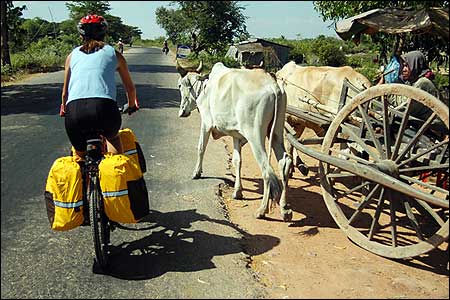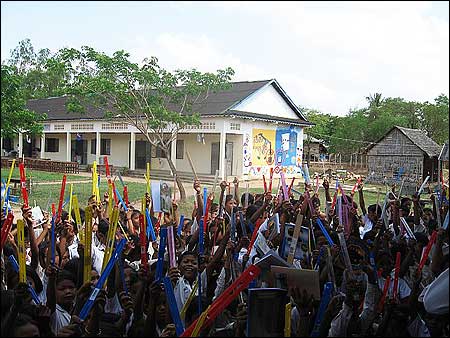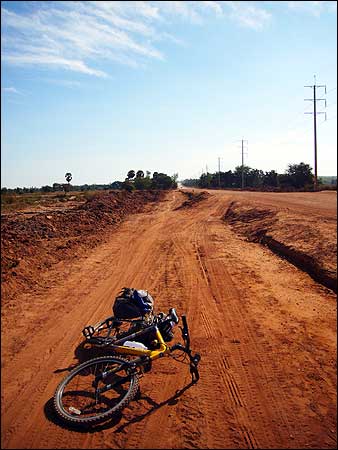| ||||||||||||||||||||||||
Daniela and her team are social entrepreneurs with a win/win model: Travelers invest their time and money in a meaningful, worthwhile project while the communities and programs benefit from the international exchange and time donated by the volunteers as well as funding for their educational programs. The PEPY team lives by the notion "Live what you give," and by giving travelers an opportunity to experience firsthand where their money has gone and to follow up on their investment, PEPY is effectively making them part of the organization. Through this model, PEPY hopes to combat illiteracy, help children in rural areas go on to secondary school (currently only about one quarter of Cambodian children make it to secondary school), spread environmental and health education and inspire their participants to be the change.
In what ways have people been changed or influenced after participating on a PEPY tour or another PEPY project? There are at least two people doing Master's research on Cambodia and one doing PhD research on Cambodia because of PEPY. Our program coordinator Maryann Bylander organized a PEPY Ride to New Orleans after the hurricanes to raise money for educational rebuilding. Also, at least three past volunteers are now working in the "responsible tourism" field. Another volunteer is now doing Teach for America as she wanted to effect educational change at home. We have a 15% return rate on our trips, and many volunteers are coming back to intern with us for 6 months. The majority continue to donate after they leave. Voluntourism seems to be gaining in popularity. Why do you think this is? Why? Because people have "been there, done that" and with voluntourism, you aren't checking something off a list. You are building relationships and learning about a people/place (or at least in my definition of "good" voluntourism you are!). That is why people come back on our trips, even if it's the same itinerary as the year before. They want to have a new experience in the same place. Now that more and more people are visiting "developing" countries, increasing numbers of people are feeling the need to give back while they travel. Plus, the whole world is on a bit of a social movement/green movement kick -- and they go hand in hand Find out where your money goes. Know where your money is going. What percent of your fee is going to the cause? Some of the big operators say, "We don't fund the projects to avoid corruption." What? What they are basically saying is: "We are too unconcerned about the issue to put in the time and research to find projects which are worth investing in, we don't care if you waste your time volunteering somewhere corrupt, and we are keeping all of your funds ourselves." We all have skills, and of course our time is valuable when we volunteer. However, volunteers are not free. It takes money and people and time to accommodate for a volunteer. Hence, unless you are bringing a specific skill which is necessary for you to do (rather than a local), then there should be some funding going to that organization as well to support your visit there, unless they specifically have the infrastructure set up to accommodate volunteers.
Know what services are coming your way, so you know what to expect. Will you be trained in doing whatever your volunteer task is? Will you be given a guide/information before you arrive as to what to expect/pack/bring? Will you also be traveling or just volunteering? Don't go for a "big" organization, just because they have a nice Web sites and packing list. The grassroots programs who KNOW the areas/programs you are supporting are the ones who will transfer your short term volunteer work into long-term sustainability by having a commitment to a place, people, or cause. How about for those who have already participated in volunteer/voluntourism related work but who want to make a bigger commitment and contribution. What are some things people can do to start their own NGO or social entrepreneur-type project? "Don't ask what the world needs. Ask what makes you come alive, and then go out and do that, because what the world needs is people who have come alive." I believe in that quote. Don't start something because you think others need it, but because you need it. If you are passionate enough about a specific change, then you will get as much if not more than you give -- and this will keep you motivated and moving forward. I met with one of the founders of Mith Samlan ("Friends" -- an amazing NGO in Cambodia) who said something to the effect of "too many groups come in here and start to act before they learn. They are doing it the wrong way around." He is right, and we were one of those. I would suggest that anyone who wants to help a cause learn about it, a lot, first, before acting. Or, find and help fund/promote/support a group that has already learned and is committed to sustainable change in the long term. Like Voluntourism, another trend is for wealthy westerners to give up their wealthy, sometimes glamorous lifestyles to start an NGO in Southeast Asia, or in other parts of the world. Cases in point are former Microsoft employee John Wood who started Room to Read and Scott Neeson, former head of Sony Pictures who gave it all up to start the Cambodian Children's Fund (CCF) and live in a slum. What do you think is driving this trend? I think people have been doing this for a long time -- and the new digital media and social networking trends have made it easier for us to learn about them. People used to do it more locally, and now more globally as we realize the interconnectedness of the world. Because dollars have more of an impact in a developing area, it's "easier" -- or so it seems to some -- to make change there. The danger -- like the above example -- is of people (including myself) working areas they know little or nothing about. It's not a good situation. It's popular now to do this -- and I don't think that's a bad thing. For people to give, I don't think it matters as much what their motivation is -- to act though -- and to make demands on that money as to how it will be used, then I think there can be negative impacts if people are not well informed. How do Cambodians respond to the presence of NGOs and development agencies? Most Cambodians who live in urban areas want to work for an NGO. That is where the money is. That is where the nice cars are (besides the government officials!). The majority welcomes them as they see them as money, but they don't necessarily believe all they are being "sold." How can people who start up projects in developing countries ensure they are successful? What important points should they bear in mind? I've already mentioned some things, but I have to emphasize: know a place -- live there first (not like we did). Do research -- call a bunch of people who live there through your connections and ask them who they respect in the development field. What organizations/people do they think are doing the best work? Get in touch with those people and volunteer your time with one of those groups for a lengthy period of time before starting anything on your own. You will understand the situation, the needs, the people, and the problems better and hopefully find local people to run it who can make those decisions even better than you can! Think back to when you first stepped foot in Cambodia and compare that to the situation now. What kinds of changes have you witnessed? Are you optimistic that Cambodia can heal its wounds from its traumatic past? The cities are growing rapidly and there is new construction each week: huge buildings, escalators (there used to only be one escalator in the whole country!), there are also more ATMs. There is very little, if any, change in some countryside areas, and in some places, the situation has gotten worse. Roads are generally better with more secure bridges and less flooding in the city. However, it will take a few generations before the emotional trauma is healed. At three years old, PEPY is still a young organization but has made a big impact. What do you think have been PEPY's biggest achievements? I think being self-critical and being willing to adapt to what we learn. We also hired Aline Meas, our Country Manager, who worked as the executive director for seven years at a wonderful non-profit here. She is a Cambodian woman with a lot of experience, vision, and works very hard for educational causes she believes in. She has transformed PEPY into an organization I can really believe in and support. See a slideshow here of some of our work and a video here about the Child Clubs Aline helped PEPY start.
We're still overcoming them. It is hard to work with governments -- both in the US and here -- for different reasons. Setting up an NGO in both countries is really frustrating, requires a lot of paperwork, and takes a lot of time. Also, meeting the right people and hiring the right mix of staff is hard, especially for someone who has never done these things before. Internal personal issues in an organization are always the most frustrating thing to deal with as a manager, but we have learned a valuable lesson: Hire people who believe passionately in the mission of the organization, and who are willing to step up, point out things that need to be changed, and act on that. They can learn skills and ideas later. If you hire based solely on skills, without the passion, it will fail. What's your long-term vision for PEPY? For it to affect change in people and in communities and inspire people to recognize their own ability to make changes in their own lives and in the causes they believe in. We're not sure of the path we will take to get there, but that is the goal. What's your day-to-day life like as the founder and active member of PEPY? There is a lot of computer time. After working as a consultant in the US right after college, I thought I hated computers. Turns out I hated working at a computer for a cause I didn't believe in -- big difference. I work with wonderful people, and I work on a ton of different things at once and sometimes I feel like my brain is going to spin off into cyberspace when it is running in too many directions, but I'm working on that. I live upstairs from my office, so I usually get up before 7, spend some time at my desk before everyone arrives at 8 (the morning meeting is at 8:15) and then move in tourism and development directions all day. I am the Phnom Penh office about 50% of the time, and then up at the school, on a PEPY Tour, meeting with partners etc the rest of the time. No matter where I am though -- there is a lot more computer time in my life than I would like, but I am much happier doing this than consulting! The first book of the PEPY Book Club is The White Man's Burden by William Easterly, which essentially argues that the West's efforts to help developing countries have failed. What's your response to his claims? It has. And still is. Because decisions are being made from afar, by people who are not there to live and breathe the impact. These people don't know enough about the people and the area to begin with. They make sweeping generalizations that if X can work here it can then work there. That doesn't even work when people in Phnom Penh are making decisions for people in rural Cambodia -- they are two different worlds. What's your advice to anyone who is thinking about pursuing a career in the international development/NGO/NPO sector? You can also look into social entrepreneurship. Business doesn't mean "no impact." The biggest changes in the world, in my opinion, will occur when businesses (and the governments controlled by them) change their actions. Big business has the potential to make decisions (hiring, sourcing, training, donating, lobbying) which can have a much bigger effect on the world than most NGOs. The main problem would be straying from your goal and becoming wrapped up in the side effects of big business such as wealth and power. Plus, for those not involved, it is easy to look at NGOs as things which do good. But sadly, not all of them do. There is a lot of competition and power struggles in NGOs. There is a lack of communication and fighting for limited funding. It's ridiculous when you see it from the inside. So my advice, whether working in a NGO or in business, is find your passion. Find what you want to be an agent of change for -- and keep that as your goal. Make your business and personal decisions around achieving that goal, and you will be able to do so. What or who inspires and motivates you to keep going? My mom -- the best 1st grade teacher in the world who really believes that education can change lives and that investing in people, one at a time, by reading to them and loving them, is a way to do that. Also, I'm inspired by people who are committed to what they believe in and don't walk away when it gets hard. I don't think I will be in Cambodia forever -- I am not able to commit to that and it would be too hard for me. But there are others who commit their life to a cause -- and I admire them. | ||||||||||||||||||||||||
A Change of Guard
សូមស្តាប់វិទ្យុសង្គ្រោះជាតិ Please read more Khmer news and listen to CNRP Radio at National Rescue Party. សូមស្តាប់វីទ្យុខ្មែរប៉ុស្តិ៍/Khmer Post Radio.
Follow Khmerization on Facebook/តាមដានខ្មែរូបនីយកម្មតាម Facebook: https://www.facebook.com/khmerization.khmerican
Monday, 4 August 2008
'Live What You Give'
Subscribe to:
Post Comments (Atom)


 Cycling through rural Cambodia in the name of education.
Cycling through rural Cambodia in the name of education. 

No comments:
Post a Comment